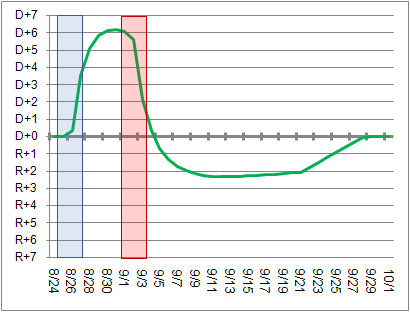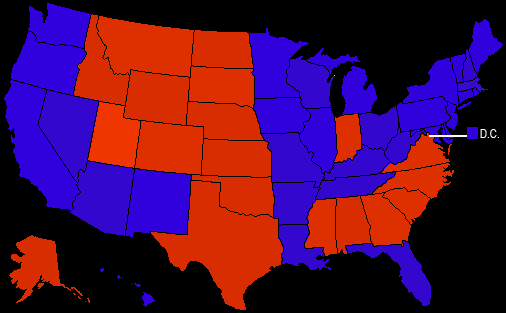Yesterday, Gallup had McCain up by 3 and Rasmussen had them tied. And those numbers included data collected on Thursday, before his speech. Thursday's numbers should be better for Obama than the data collected on Sunday. In today's tracking polls, Thursday will cycle out and be replaced by Sunday. So we should expect McCain's lead to grow. In that context, a USA Today/Gallup poll that puts McCain ahead 50-46 (registered voters; 54-44 if looking at likely voters) should not be much of a surprise.
What's happened is that the Republicans had a great convention. The base is excited and Sarah Palin has become the new hot topic in the media. Unfortunately, rather than focusing on her love of book-banning and disdain for science, the media has been consumed with itself (?), wondering over the last few days how they didn't know in advance, whether or not they are being sexist, and when she is finally going to talk to the them.
How long will this convention bounce last? Because the conventions were so close together, the McCain's bounce should last a bit longer than Obama's bounce. From 538.com:
That is, the Republicans would still be getting some residual benefit from having had the last convention for perhaps as many as two or three weeks from today.So panic not. In 1996, after the Republican National Convention, Bob Dole got big bounce. In one poll he went from trailing by 20 points to trailing by only two, a difference within the margin of error. And this was the result on election day, a 379-159 electoral vote landslide for President Bill Clinton.
Intuitively, that feels somewhat wrong to me. Most conventions are held over the summer, when the news cycle is much slower, and the convention gets to linger for longer as the last thing on voters' minds. This does, however, raise an important point: political time is relative rather than absolute. If it feels like the Democratic Convention was a month ago -- well, in political time, it might as well have been a month ago, since Sarah Palin and the Republican Convention displaced it as the first thing that voters will recall when they think about the election.
What I am saying, then, is that we should evaluate the robustness of the Republican bounce by how well it holds up to the currents of political time, rather than any specific date on the calendar. Specifically, I would want to see how the bounce holds up to the next major development of the campaign, particularly if it is a pro-Obama development. For example, let's say that Colin Powell endorses Obama tomorrow morning. I might expect a fairly strong reaction to this in the polls, not because the endorsement is all that important unto itself (most endorsements aren't), but because it displaces the GOP Convention as the most recent event of the campaign -- it pushes political time forward. And if the polls didn't move in reaction to such an endorsement, I'd think Democrats would have reason to worry.













0 comments:
Post a Comment